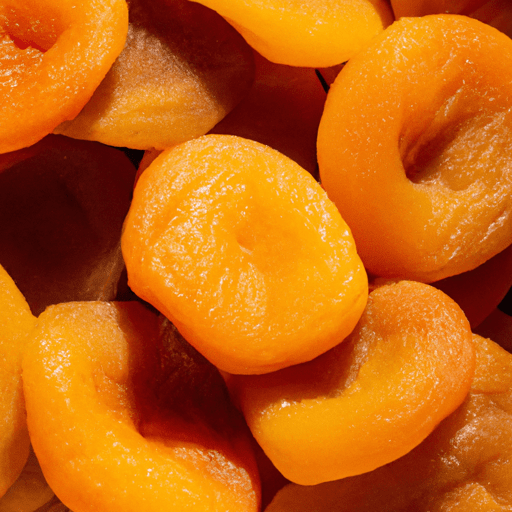The Exquisite Delight of Dried Apricots
When it comes to versatile and delicious dried fruit, few can rival the delightful dried apricot. These chewy gems pack a punch with their intense flavor and are a favorite ingredient in countless recipes. Today, we’re going to delve into the world of dried apricots and uncover their fascinating history, culinary uses, exceptional nutritional value, and more!
Taste Sensation
Dried apricots are a flavorful treat that perfectly balances sweetness and tanginess. Their concentrated taste offers a burst of fruity goodness in every bite. The rich, vibrant orange color adds to their visual appeal, making them an irresistible addition to both sweet and savory dishes.
Versatile Culinary Delight
In the realm of cooking, dried apricots shine in a multitude of recipes. Their distinctive flavor and chewy texture make them a sought-after ingredient in both traditional and contemporary cuisine. Here are some delightful ways to incorporate dried apricots into your kitchen adventures:
1. Baking Magic
Dried apricots lend their natural sweetness to baked goods, infusing them with a unique fruity taste. From cookies and muffins to cakes and scones, these dried delights enhance both the flavor and texture of your favorite treats. Whether they’re chopped into small pieces or pureed for a smooth consistency, dried apricots add a touch of culinary enchantment to every bite.
2. Savory Sensations
While dried apricots are often associated with desserts, they also excel in savory dishes. Try pairing them with roasted meats or poultry to create a delightful contrast between the savory protein and the sweet-tangy notes of the fruit. Their ability to elevate dishes with Middle Eastern and Mediterranean influences is unparalleled, making them a staple in tagines, couscous, and rice pilafs.
3. Stellar Snacks
The sheer convenience and delightful taste of dried apricots make them an excellent snack option for those on the go. Whether enjoying them on their own or pairing them with nuts and cheese, these succulent morsels offer a healthy, satisfying treat packed with fiber and flavor.
Nutritional Powerhouse
Beyond their delectable taste, dried apricots are a nutritional powerhouse. Bursting with essential vitamins and minerals, they provide numerous health benefits. Here are some key highlights:
- Vitamin A: Dried apricots are abundantly rich in vitamin A, benefiting your vision, immune system, and skin health.
- Dietary Fiber: These chewy fruits are an excellent source of dietary fiber, aiding digestion and promoting a healthy gut.
- Potassium: Dried apricots are surprisingly high in potassium, a mineral vital for maintaining healthy blood pressure and heart function.
- Antioxidants: Packed with antioxidants, dried apricots help combat harmful free radicals and protect your body from oxidative stress.
A Peek into History
The story of dried apricots dates back thousands of years. Originating from ancient China, they were renowned as a symbol of beauty and luxury. They traveled along the Silk Road, captivating travelers with their tantalizing flavor and preserving properties. With time, dried apricots found their way to the Mediterranean region, where they flourished in the warm embrace of the sun-drenched lands.
Fun Facts
Here are a few intriguing facts that will deepen your appreciation for dried apricots:
- Dried apricots have a much higher concentration of nutrients compared to fresh apricots due to the removal of water content.
- Turkey is the world’s leading producer of dried apricots, followed closely by Iran, Uzbekistan, and the United States.
- In many cultures, dried apricots are believed to possess healing properties and are used in traditional medicine for ailments such as indigestion and constipation.
Final Thoughts
Dried apricots are a testament to nature’s ability to create both mouthwatering treats and nutritious powerhouses. Their versatility in various culinary creations, exceptional taste, and historical significance make them a cherished delight in kitchens worldwide. So, the next time you encounter these vibrant orange wonders at your local grocery store or pantry, be sure to embrace the culinary magic they have to offer.
Dried Apricot
Origin: The apricot (Prunus armeniaca) is a fruit tree native to China, where it has been cultivated for over 4,000 years. Apricots were then introduced to Europe by the Romans, and from there, their cultivation spread to various parts of the world.
Common Uses: Dried apricots are a popular ingredient in both sweet and savory dishes. They can be consumed on their own as a snack, added to trail mixes, granola, or baked goods like muffins and cakes. In savory dishes, dried apricots are often used in tagines, stews, and couscous recipes to add a subtly sweet and tangy flavor.
Nutritional Benefits: Dried apricots are a good source of dietary fiber, vitamin A, potassium, and antioxidants. They also contain smaller amounts of vitamins C and E, calcium, and iron. A 100-gram serving of dried apricots provides around 48% of the recommended daily intake of vitamin A, which is essential for maintaining healthy vision, immune function, and cell growth.
Unique Properties: Dried apricots have a naturally sweet and slightly tart flavor, which intensifies during the drying process. This concentration of flavors makes them a versatile ingredient, suitable for both sweet and savory dishes. Additionally, dried apricots have a chewy texture and a vibrant orange color.
Historical Significance: Apricots have significance in various cultures and folklore. In Armenian folklore, apricots are believed to have mystical powers that protect against evil spirits. Similarly, in Greek mythology, the apricot was associated with the goddess Hera, symbolizing love and fertility. Apricots have long been considered a symbol of good luck and abundance in many cultures around the world.
Note: While dried apricots offer numerous health benefits, they are also high in natural sugars and calories. Moderation is key when incorporating them into a balanced diet. It’s always advisable to consult a healthcare professional or registered dietitian for personalized dietary advice.




Use the share button below if you liked it.
It makes me smile, when I see it.